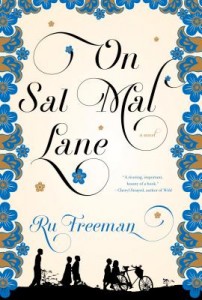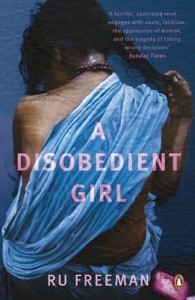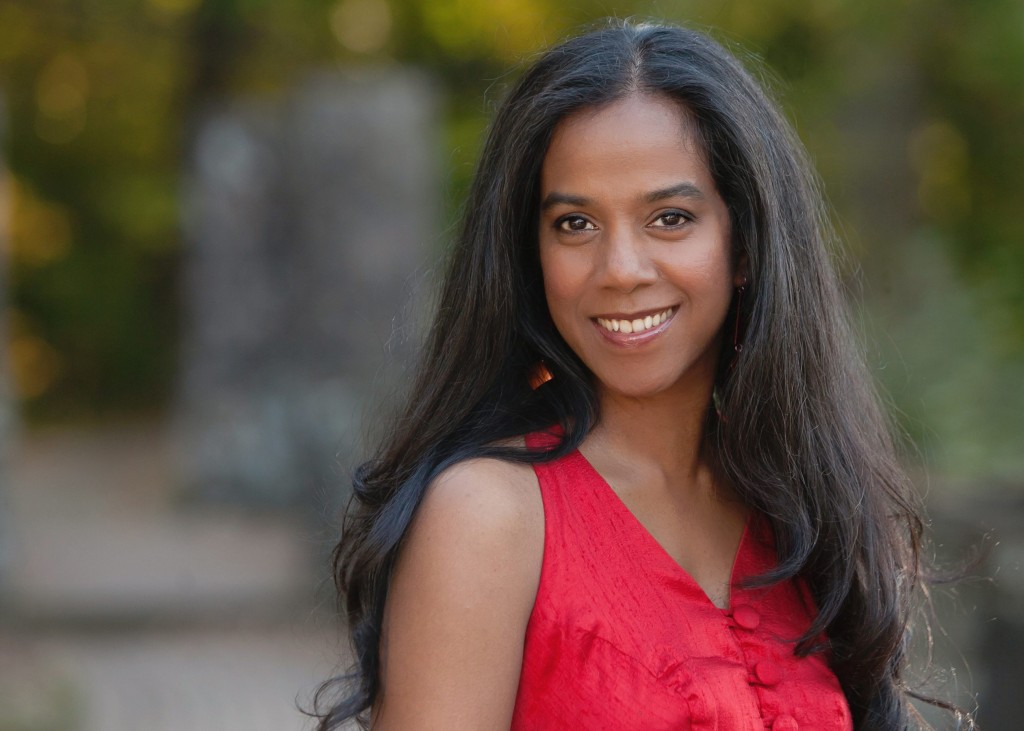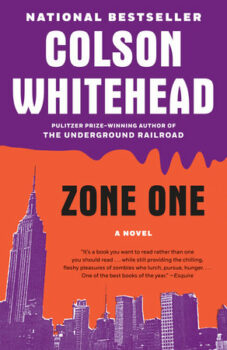Ru Freeman is part of the happy hodgepodge of people whose faces keep popping up on my Facebook newsfeed, so whether she knows it or not, I feel as though we keep in touch regularly. We first met at the South Asian Literary and Theater Arts Festival in 2009, the year both our debut novels were published. I was new to book talk—so was she, I assumed—but when we shared the stage, I found myself sitting next to a woman who was not only gifted at writing, but gifted at discussing her writing (a rare and enviable quality). Over the years, I’ve come to know Ru as a passionate, intelligent voice, driven by a desire to tell stories about ordinary Sri Lankans impacted by extraordinary events. That urgency animates every line of her beautiful new novel On Sal Mal Lane, about a band of loyal siblings forced to come of age during an explosive moment in Sri Lankan history.
Ru is also the author of the novel A Disobedient Girl (Atria Books, 2009), which was longlisted for the DSC South Asian Literary Prize. Her writing has appeared in VQR, Story Quarterly, Guernica, and elsewhere. She has come a long way from her hometown of Colombo, Sri Lanka, and is now settled in Bala Cynwyd, Pennsylvania, but she calls both Sri Lanka and America home.
Interview:
Tania James: I suspect your family was a literary one. Was writing encouraged by your parents? What books were you drawn to in your youth?
Ru Freeman: I grew up with the idea that words—read, written, uttered aloud—were important. They were the meat, muscles, bones of persuasion. Everything revolved around how well we could handle words. My mother taught English literature and Greek and Roman classics (history and literature in translation), and my father—a civil servant—also wrote poetry. My older brothers and I, therefore, took to language and writing the way the children of mountain homesteaders take to running about in tall grass without fear of ticks and rattlesnakes.
As a child I read whatever I could find. We weren’t wealthy enough (in financial terms, anyway) to buy new books easily, so most of what I read was borrowed or gifted to us through, oddly enough, an American initiative (the Asia Foundation), or bought for a song from a Soviet initiative (The People’s Publishing House). There’s more on my childhood and books here in the Fall/Winter 2010 issue of Pebble Lake Review.
Did you dabble in music as well, like Suren, the eldest child of the Herath family?
Yes, I played the piano—as did my brothers. They also played the violin and my oldest brother—much like Suren—was a gifted musician who could play any instrument he picked up. For me it was mostly the piano, a little guitar (that my oldest brother taught me), and singing any chance I could get.
Oh, you talented Von Trapps. You’re the musical trio my mom always yearned for. Listening to you describe your siblings, I can’t help but think of them with the same affection I have for the Herath children. The love and loyalty among the Heraths feels profoundly—and, at times, painfully—true. Mrs. Herath was another favorite of mine. Was there any one character that you found difficult to pin down?
Ha! It is the kind of thing you long for if you don’t have to live with it—there would be times when each of us would be singing a different song and/or playing a different instrument in different parts of the house. It drove my father crazy sometimes. He was more bookish and inwardly focused, not so much about public expression of anything.
But to answer your question, it was difficult to capture the nuances in all of them. I had some bones, some notion of this or that thing about them, but when they started interacting with each other and the neighbors, with the political events, then everything began to be up in the air. What they thought about, how things slowly change them. The only fortunate thing for me is that as a writer I enjoy telling myself the stories I’m writing—so I’m okay with them misbehaving, doing things I hadn’t thought they would do. It amuses me, it can make me sad, but it keeps me writing. I guess the hard thing to avoid was explaining any one character, particularly those adults. I had to let them be seen only as they were seen by the children, understood only to that extent, except for those occasions when the narrator/the street steps in, albeit obliquely.
Did you start writing the novel at page one? And did you have any knowledge that it would open up into such a broad tapestry of perspectives?
 It started with the prologue—but it wasn’t a prologue then. It was a story about the families, so it was all about the characters. As I then went on with it, I re-wrote that prologue. I had a few stand-alone chapters at first. I was trying to get at this story, and I had a sense of what it might contain at an emotional level, but I had no idea how to do it, or who might play a part in the unfolding, or what all they might even do. There was a point at which I just thought this book is a failure, I should just chuck it and find another story to write. I happened to go to New York to be there for a Sunday Salon reading that I have been helping to organize for the past several years, a Bread Loaf Writers’ Conference reading with writers of color. Emily Raboteau was there. And she happened to mention how much her then partner, now husband, Victor LaValle had loved the first pages that I had submitted as part of an application for a residency, and she also suggested a book I might read to help me along. That conversation changed everything for me. It reaffirmed my desire to tell the story—and indeed my faith in myself as a writer which, as you know, is always fragile! And it gave me some critical insight into how I might do the work. I owe them both, big time.
It started with the prologue—but it wasn’t a prologue then. It was a story about the families, so it was all about the characters. As I then went on with it, I re-wrote that prologue. I had a few stand-alone chapters at first. I was trying to get at this story, and I had a sense of what it might contain at an emotional level, but I had no idea how to do it, or who might play a part in the unfolding, or what all they might even do. There was a point at which I just thought this book is a failure, I should just chuck it and find another story to write. I happened to go to New York to be there for a Sunday Salon reading that I have been helping to organize for the past several years, a Bread Loaf Writers’ Conference reading with writers of color. Emily Raboteau was there. And she happened to mention how much her then partner, now husband, Victor LaValle had loved the first pages that I had submitted as part of an application for a residency, and she also suggested a book I might read to help me along. That conversation changed everything for me. It reaffirmed my desire to tell the story—and indeed my faith in myself as a writer which, as you know, is always fragile! And it gave me some critical insight into how I might do the work. I owe them both, big time.
That prologue is one of the most fascinating aspects of the book. I love the voice in part because it’s such a bold risk: the way it compacts so much history and politics, the way it calls its own authority into question. How did you arrive at that voice?
Out of the blue, really. I had some introductory sections written—there was a very lengthy description of the families down that lane, the way they were and so forth—but I felt something was not quite right. I went back and forth with it until I realized I wanted a voice that had real command over the story that was going to be told. A voice that was at once observer and commentator, intimate, yet distant. In short, an old voice, one that precedes and outlasts whatever happens on this lane. I could say I came to it because I needed it, as the writer, to take my own opinions out of it too—it certainly helped. I think that of all the parts of the book, this was the one that I worked on the longest and hardest.
Did you struggle with how to incorporate history/set the stage? You mentioned that you didn’t start here, with the prologue—what made you add it later on?
I had a prologue, just not this one that encompasses, as you say, so much of that history. The history is not the story. This is what I believe. Richard Bausch once said, “Bad politics hurt human beings and good writers report that damage.” (i.e., not the politics, the damage.) We disagree on the extent to which a writer him/herself should throw themselves into the political fray—I do, routinely, he does not. But we agree on this point that you don’t write about politics, you write about what it does to people. It was true in my first novel, A Disobedient Girl, where someone complained that I hadn’t included more information about the political upheavals. Why would I? The main protagonists were circumscribed by things that were closer to home, and the politics of the day was just a backdrop. With this book I write about the politics to the extent that they impacted these people directly, changing them for the better or the worse, in what they do with and to and for one another. So in writing this prologue I set a stage for the context in which these transformations take place, but I worked diligently to leave it with brush strokes rather than, you know, a complete depiction of everything. I kept what was necessary—in terms of the history and the voice—and took everything else out.
I like this distinction you make between writing about politics versus writing about the impact of politics on people. And yet there is so much about the Sri Lankan Civil War that most readers—myself included—don’t entirely understand, from the various political movements and factions operating in and outside of Sri Lanka, to the Language Laws, to the incredible violence, so much of it unreported or at least under-reported. I admire the way you were able to distill such a powerful, personal story from this very complicated backdrop.
Did you ever have doubts about tackling this particular chapter in Sri Lanka’s history? And how was it challenging, if at all, to write about a crisis you were so close to, having experienced the early shocks of the war?
I didn’t start out to write about this particular chapter in Sri Lanka’s history so much as I started to write about this street and the children who lived down it and these years, which happened to be the years during which we found ourselves, as a nation, facing the ugliest aspects of ourselves as well as our best selves. Keeping the focus on that original intention, staying close with these characters, this street, allowed me to write the story that also encompassed what came before, what came after.
My reach was always to depict what was worth keeping, saving, and what was lost. And that thing that was lost, could we get it back? And if we could, why do I believe it is still possible? The novel answers that question, I think, in depicting what it is that makes reconciliation possible, the what preceded, as it were. To reconcile is not to forget, not to pretend terrible things did not happen, it is to harken to the Latin roots of that word, reconciliāre (to make good again, to repair), and that is what, in part, this story attempts in those political terms that you mention. To acknowledge what happened, to look it squarely in the face, to set down an account of a time, not merely in terms of the dates and numbers preferred by chroniclers of history/politics and politicians (including expatriate politicians), but in terms of ordinary people, the children who grew up to inherit the fall out of those times.
It was not difficult to write, it was difficult to witness and hard to continue to observe, terrible to see friends die at the hands of one group or another over the years, worse to see how we all began to redefine that term, “home.” Worst of all, for me, was the way the struggles of the people I refer to as “my people” (Sri Lankans), came to be portrayed abroad, what the country itself came to be associated with. Writing was not the hard part in the end.
Could you talk a bit about your activism, and how it informs your writing, if at all?
 My activism is almost entirely through writing. This is the skill that I have. I remember during the recent election, a community organizer, an elderly, well-intentioned, gentleman giving me some grief about the fact that I hadn’t signed up to pound the pavements several days in a row. I had done some of it, I had made calls, but I couldn’t commit to more than that. I had to explain that we all do what we can—and to do what somebody else may do better is not the best use of my time nor the best for our common cause. Writing about politics comes easily to me so long as I am impassioned about something. It has to get under my skin. So, for instance—and please don’t slight me for this—I care about the environment, but it doesn’t get me worked up the same way public education does, or the roots of the Occupy Movement, or AIPAC [The American Israel Public Affairs Committee], or issues of health and a host of social-justice issues surrounding women and girls, or Sri Lanka…..so I don’t really get involved. I recycle, I turn off the lights, I try to walk lightly, but I don’t put pen to paper about that issue very readily.
My activism is almost entirely through writing. This is the skill that I have. I remember during the recent election, a community organizer, an elderly, well-intentioned, gentleman giving me some grief about the fact that I hadn’t signed up to pound the pavements several days in a row. I had done some of it, I had made calls, but I couldn’t commit to more than that. I had to explain that we all do what we can—and to do what somebody else may do better is not the best use of my time nor the best for our common cause. Writing about politics comes easily to me so long as I am impassioned about something. It has to get under my skin. So, for instance—and please don’t slight me for this—I care about the environment, but it doesn’t get me worked up the same way public education does, or the roots of the Occupy Movement, or AIPAC [The American Israel Public Affairs Committee], or issues of health and a host of social-justice issues surrounding women and girls, or Sri Lanka…..so I don’t really get involved. I recycle, I turn off the lights, I try to walk lightly, but I don’t put pen to paper about that issue very readily.
When I write the political pieces that is all I am focusing on—advocating for my agenda in as well as I can, usually pretty unflinching and stark. I don’t do that with fiction. In fiction I am a nicer person (!), looser, gentler, and much more conscious of our humanity, particularly the humanity of the people with whom I would—in my politics—disagree to the bitter end. In my fiction I treat everybody as though they are my family, people I have to love no matter what. This is the more important “political” writing that I do, the writing that makes me uncomfortable but has the better chance to transform my reader and me both.
Further Links and Resources:
- For more on Ru Freeman and her work, please visit the author’s website.
- You can also follow her on twitter: @rufreeman.
- Here are recent reviews of On Sal Mal Lane in the Miami Herald, Newsday, and the StarTribune.
- And here is Cristina García’s very positive review of the novel, which will appear in this weekend’s New York Times Sunday Book Review.
- You can also read our recent interview with García, whose newest book, King of Cuba, is just out.
- And be sure to check out J.T. Bushnell’s glowing FWR review of Tania James’s most recent book, Aerogrammes and Other Stories.
- For more on Tania James and her work, please visit her website.






